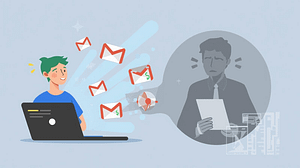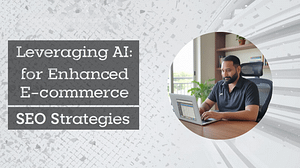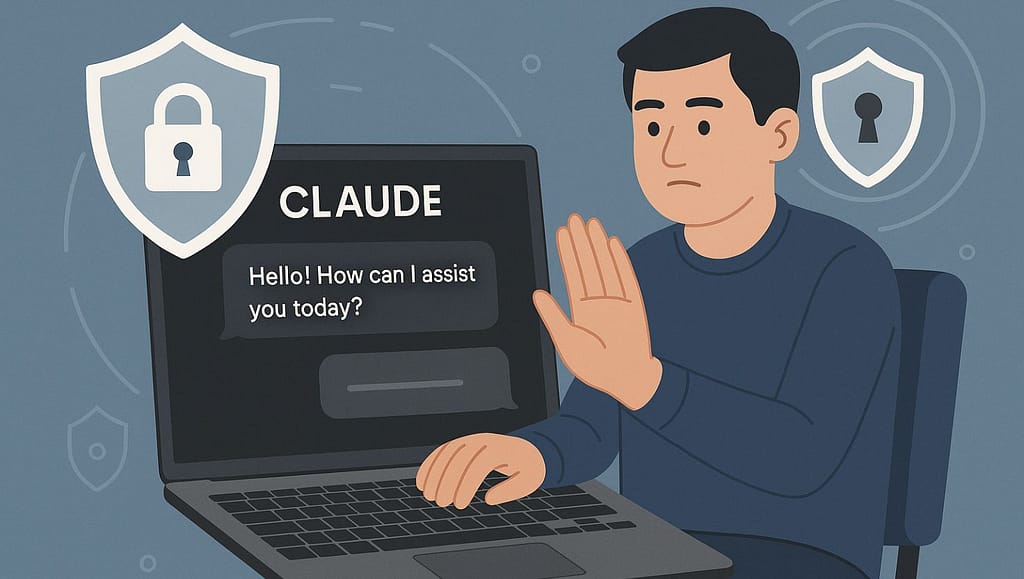AI Privacy Alert: What Anthropic New Claude Data Policy Means for Your Private Conversations in 2025
The artificial intelligence landscape is shifting beneath our feet, and your private conversations with AI assistants might not be as private as you think. Starting September 28, 2025, Anthropic—the company behind the popular Claude AI assistant—will begin using user conversations to train its AI models, marking a significant departure from their previous privacy-first approach.
This change affects millions of users worldwide who have grown comfortable sharing sensitive information, work ideas, and personal thoughts with Claude AI. Understanding what this means for your digital privacy and how to protect yourself has never been more crucial.
What Is Anthropic’s New Claude Data Policy?
Anthropic’s new data policy represents a fundamental shift in how the company handles user conversations. Previously, Claude AI privacy Policy maintained a strict policy of not using user conversations for model training unless users explicitly provided feedback. This approach set Anthropic apart from other AI companies and built trust among privacy-conscious users.

The new policy automatically opts all users into data collection for model training purposes. According to Anthropic’s official statement, conversations will now be used to “improve model safety, making systems for detecting harmful content more accurate and less likely to flag harmless conversations.” Additionally, the data retention period extends to five years for users who allow their data to be used for model improvement.
Research indicates that this change aligns with broader industry trends, as AI companies increasingly seek more training data to enhance their models’ capabilities and safety features. However, the automatic opt-in approach has raised concerns among privacy advocates and users alike.
Why Are AI Companies Changing Their Data Practices?
The shift toward using user data for AI training stems from several key factors that are reshaping the industry in 2025.
The Data Quality Challenge
Studies show that AI models require high-quality, diverse datasets to improve performance and reduce harmful outputs. Real user conversations provide valuable insights into how people actually interact with AI systems, offering training data that laboratory-generated content cannot replicate.
Safety and Alignment Improvements
Experts agree that analyzing real conversations helps AI companies identify potential safety issues and improve content moderation systems. By understanding how users attempt to bypass safety measures or generate harmful content, companies can build more robust safeguards.
Competitive Pressure
The AI industry’s rapid evolution creates pressure for companies to continuously improve their models. Access to real conversation data provides a competitive advantage in developing more capable and safer AI systems.
How Does This Affect Your Privacy?
Understanding the privacy implications of Anthropic’s policy change requires examining what data is collected and how it’s used.
What Information Gets Collected?
When you opt into Anthropic’s new policy, your conversations with Claude AI become part of the company’s training dataset. This includes every question you ask, every response you receive, and the context of your interactions. The company states that this data helps improve model safety and reduce false positive content flags.
Data Retention and Security
User data will be retained for up to five years under the new policy, significantly longer than many users might expect. Anthropic maintains that this data is stored securely and used solely for model improvement purposes, but the extended retention period raises questions about long-term data security.
Anonymization and De-identification
While Anthropic claims to anonymize user data before using it for training, privacy experts note that completely removing identifying information from conversational data remains technically challenging. Context clues, writing patterns, and specific details shared in conversations can potentially be traced back to individual users.
What Are the Risks of AI Data Training?
The implications of allowing AI companies to train on your private conversations extend beyond immediate privacy concerns.
Professional and Personal Exposure
Many users discuss work projects, business ideas, and personal matters with AI assistants. This information could theoretically become part of the AI’s knowledge base, potentially appearing in responses to other users’ queries. While companies implement safeguards against this, the risk exists.
Data Breach Vulnerabilities
Storing user conversations for extended periods increases the potential impact of data breaches. If Anthropic’s systems were compromised, five years’ worth of user conversations could be exposed, affecting millions of users’ privacy.
Future Policy Changes
Today’s data policies might not reflect tomorrow’s practices. Companies that begin collecting user data often expand their usage over time, potentially using your conversations for purposes not currently disclosed.
How to Protect Your AI Conversation Privacy
Protecting your privacy in the age of AI data collection requires proactive steps and ongoing vigilance.
Step-by-Step Guide to Opt Out of Claude’s Data Training
- Log into your Claude AI account using your regular credentials
- Navigate to Settings by clicking your profile icon or menu
- Select Privacy Settings or Data Controls from the menu options
- Locate the “Training on my chats” toggle or similar option
- Switch the toggle to “OFF” to prevent your conversations from being used for training
- Save your changes and verify the setting is applied
- Review your settings periodically as policies may change

Remember, you can modify these settings at any time, giving you control over your data sharing preferences.
Additional Privacy Protection Strategies
Beyond opting out of data training, consider these privacy protection measures:
Use Temporary Conversations: Many AI platforms offer temporary or incognito modes that don’t save conversation history.
Avoid Sensitive Information: Never share personal identifiers, passwords, financial information, or confidential business details with AI assistants.
Regular Privacy Audits: Periodically review and update your privacy settings across all AI platforms you use.
Alternative Platforms: Consider using AI platforms with stronger privacy commitments or local AI tools that process data on your device.
AI Privacy Tools and Resources
| Resource Name | Link |
|---|---|
| Protecto AI | protecto.ai |
| Private AI | private-ai.com |
| Securiti AI | securiti.ai |
| Privacy Tools Guide | privacytools.io |
| Electronic Frontier Foundation | eff.org/issues/privacy |
| MIT AI Data Privacy Guidelines | MIT Sloan EdTech |
| IBM AI Privacy Insights | ibm.com/think/insights/ai-privacy |
| FTC AI Privacy Guidelines | FTC AI Policy |
| TrustArc AI Regulations | trustarc.com/ai-regulations |
| Brookings AI Privacy Report | Brookings AI Privacy |
| Qualys AI Security | Qualys AI Blog |
| Secure Privacy | secureprivacy.ai |
The Broader Industry Implications
Anthropic’s policy change signals a broader shift in the AI industry’s approach to user data and privacy.
Industry-Wide Trends
Research indicates that most major AI companies are moving toward using user data for model improvement. This trend reflects the competitive pressure to develop more capable AI systems and the technical reality that real user interactions provide valuable training data.
Regulatory Responses
Privacy regulators worldwide are paying increased attention to AI companies’ data practices. The European Union’s AI Act and similar regulations in other jurisdictions may soon impose stricter requirements on how AI companies collect and use personal data.
User Awareness and Rights
The AI industry’s evolution is creating new categories of digital rights and user protections. Understanding these rights and exercising them proactively will become increasingly important for maintaining privacy in the AI age.
What This Means for the Future of AI Privacy
The changes to Claude’s data policy represent a pivotal moment in AI privacy, with implications extending far beyond a single company’s practices.
Setting Industry Precedents
As one of the more privacy-conscious AI companies, Anthropic’s policy change may encourage other companies to implement similar data collection practices. This could normalize the use of user conversations for AI training across the industry.
User Education and Awareness
The controversy surrounding these changes highlights the need for better user education about AI privacy. Many users remain unaware of how their data is collected, stored, and used by AI companies.
The Path Forward
Balancing AI improvement with user privacy will require ongoing dialogue between companies, regulators, and users. Transparent communication, user control, and strong security measures will be essential for maintaining trust in AI systems.
Taking Control of Your AI Privacy Alert
The evolution of AI privacy policies like Anthropic’s Claude data training change serves as a crucial reminder that users must actively protect their digital privacy. While these changes may improve AI safety and capabilities, they also represent a significant shift in how personal data is used in the AI ecosystem.
The most important step you can take is to review and adjust your privacy settings across all AI platforms you use. Don’t assume that default settings protect your privacy—companies increasingly default to data collection unless you explicitly opt out.
Stay informed about privacy policy changes, regularly audit your settings, and consider the long-term implications of sharing sensitive information with AI assistants. Your privacy is valuable, and protecting it requires ongoing attention and action.
Ready to protect your AI conversation privacy?
Log into your Claude AI account now and adjust your data training settings before September 28, 2025. Your future self will thank you for taking action today.
FAQs
When does Anthropic start using my Claude conversations for training?
The new policy takes effect on September 28, 2025. After this date, all conversations with Claude AI will automatically be used for model training unless you manually opt out before the deadline. You have until September 28 to change your privacy settings if you don’t want your chats included in training data.
How do I opt out of Claude AI data training right now?
To opt out immediately:
- Log into your Claude AI account
- Go to Settings → Privacy Settings (or Data Controls)
- Find the toggle for “Training on my chats” or “Use my data for model improvement”
- Switch it to OFF
- Save your changes
You can change this setting at any time, even after the September 28 deadline.
What happens to my old conversations before September 28, 2025?
Your previous conversations are generally protected under the old policy, but this depends on your current privacy settings. To be completely safe, opt out now to ensure both past and future conversations remain private. Anthropic has not explicitly clarified whether historical data will be grandfathered under the old policy.
Will my personal information be shared with other Claude users?
No, Anthropic states that your conversations won’t be directly shared with other users. However, the information from your chats becomes part of the training data, which means patterns, insights, and knowledge from your conversations could theoretically influence responses given to other users, though in an anonymized and aggregated way.
How long does Anthropic keep my conversation data?
Under the new policy, conversation data is retained for up to 5 years if you allow it to be used for model improvement. This is significantly longer than many users expect and represents a major change from previous practices. If you opt out, your data retention follows different, shorter timelines.
Can I delete my existing Claude conversation history?
Yes, you can typically delete your conversation history through your account settings. Look for options like “Delete conversation history” or “Clear chat data” in your Claude AI account settings. However, if you’ve already opted into data training, previously collected data may have already been processed.
Is my work-related or confidential information safe with Claude?
This is a major concern with the new policy. If you’ve shared confidential business information, proprietary ideas, or sensitive work details with Claude, this information could become part of the training dataset. For maximum protection of confidential information, you should opt out of data training immediately and avoid sharing sensitive details with AI assistants in the future.
Are other AI companies like OpenAI and Google doing the same thing?
Yes, this is becoming an industry trend. Many AI companies are moving toward using user conversations for model improvement. OpenAI has similar policies for ChatGPT, and Google uses conversation data for Bard/Gemini training. However, policies vary between companies, so check each platform’s privacy settings individually.
What if I forget to opt out before September 28, 2025?
Don’t panic—you can still opt out after the deadline. Anthropic allows users to change their privacy settings at any time. However, any conversations that occurred while you were opted in (after September 28) may have already been processed for training. The sooner you opt out, the less of your data will be used.
Will opting out affect my Claude AI experience or features?
No, opting out of data training should not impact your ability to use Claude AI or access its features. Your conversations will function exactly the same way—you’ll still get the same quality responses and have access to all capabilities. The only difference is that your conversations won’t be used to improve future versions of the AI model.







